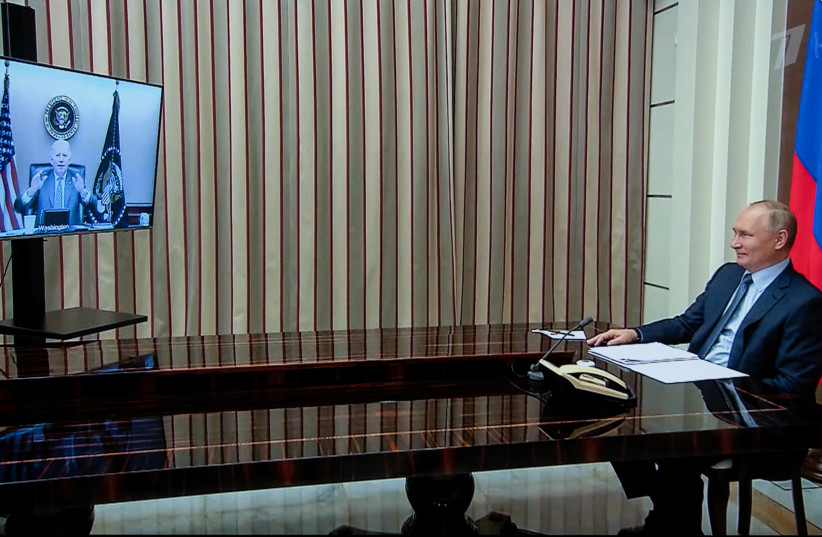US President Joe Biden and Russia’s President Vladimir Putin spoke by phone on Saturday after Washington and its allies warned that Russian forces could invade Ukraine at any moment.
A senior American official said that according to intelligence estimations, Moscow is looking at Wednesday as a target date to start the invasion, AP reported.
“President Biden was clear that, if Russia undertakes a further invasion of Ukraine, the United States together with our Allies and partners will respond decisively and impose swift and severe costs on Russia,” the White House stated in a readout of the call.
“President Biden reiterated that a further Russian invasion of Ukraine would produce widespread human suffering and diminish Russia’s standing,” the statement reads.
A senior administration official later said that while the call between the two presidents “was professional and substantive, and lasted a bit over an hour,” it produced “no fundamental change in the dynamic.” According to the official, “it remains unclear whether Russia is interested in pursuing its goals diplomatically as opposed to through the use of force.
“We remain committed to keeping the prospect of de-escalation through diplomacy alive, but we are also clear-eyed about the prospects of that, given the readily apparent steps Russia is taking on the ground in plain sight right before our eyes,” the official continued. “The stakes in this are too high not to give Russia every chance to avoid an action that we believe would be catastrophic.
“Our deliveries of security assistance to Ukraine have continued in recent days – and our discussions with the EU, UK, Canadian and other partners and allies to ensure that we are prepared to immediately impose severe financial sanctions and export controls are also reaching a culminating point,” the official noted.

The two presidents agreed that their teams remain engaged in the days ahead, the official said.
“Russia may decide to proceed with military action anyway. Indeed, that is a distinct possibility. If it does, the damage to Ukraine, to European security and, yes, to Russia will be profound. That is an outcome President Biden believes we should continue to work hard to avert.”
PUTIN TOLD Biden that the US response to Russia's main security demands had not taken into account key concerns and that Moscow would respond soon, the Kremlin said.
Kremlin official Yuri Ushakov said the phone call took place against a backdrop of "hysteria" in the West about an impending Russian invasion that he said was absurd.
He said that Biden in the phone call warned Putin of major potential sanctions, but did not place special emphasis on it.
The US State Department ordered most of its embassy staff to leave Ukraine, adding to its call on Friday for private citizens to get out of the country within 48 hours. The Pentagon said it was withdrawing about 150 military trainers.
Russia’s military buildup near Ukraine and a surge of military activity have fueled fears that it could invade. Moscow denies having any such plans.
Washington said on Friday that a Russian invasion of Ukraine, likely beginning with an air assault, could occur at any time.
Portugal, Australia, New Zealand, Germany, Italy, the Netherlands and other countries, including Israel, have also urged their citizens to leave the beleaguered country.
US national security adviser Jake Sullivan said Americans could not expect military evacuation if they remained in Ukraine and should leave within 48 hours.
“We continue to see signs of Russian escalation, including new forces arriving at the Ukrainian border,” Sullivan told reporters. “We are in the window when an invasion could begin at any time.”
“If a Russian attack on Ukraine proceeds, it is likely to begin with aerial bombing and missile attacks that could obviously kill civilians without regard to their nationality,” he said.
MOSCOW HAS repeatedly disputed Washington’s version of events, saying it has massed more than 100,000 troops near the Ukrainian border to maintain its own security against aggression by NATO allies.
In a phone call with US Secretary of State Antony Blinken, Russia’s top diplomat Sergei Lavrov accused the United States and its allies of waging a “propaganda campaign” about Russian aggression toward Ukraine, the Russian Foreign Ministry said.
Russian Defense Minister Sergey Shoigu and his US counterpart Lloyd Austin also talked by phone on Saturday, Interfax news agency and the Pentagon said.
Also on Saturday, the Russian military said it had used “appropriate means” to make a US submarine depart from Russian waters in the far east after the vessel ignored a Russian request to leave, Interfax news agency reported.
The submarine was detected near the Pacific Kuril Islands in Russia’s waters as Moscow conducted naval exercises, the military was quoted as saying.
Putin, jostling for influence in post-Cold War Europe, is seeking security guarantees from Biden to block Kyiv’s entry into NATO and missile deployments near Russia’s borders.
Washington regards many of the proposals as non-starters but has pushed the Kremlin to discuss them jointly with America and its European allies.
Still, Biden has long believed that one-on-one engagement with Putin may provide the best chance for a resolution. Two calls in December between the two superpower leaders produced no breakthroughs but set the stage for diplomacy between their aides.
The two have not spoken since, and diplomats from both sides have struggled to find common ground.
Four-way talks in Berlin between Russia, Ukraine, Germany and France on Thursday made no progress.
Several thousand Ukrainians rallied in Kyiv on Saturday to show unity amid fears of an invasion, as President Volodymyr Zelensky told people not to panic, pushing back against what he said was a glut of bleak war predictions being reported in the media.
Still, Washington planned to send 3,000 extra troops to Poland, Ukraine’s western neighbor, in the coming days to try to help reassure NATO allies, four US officials told Reuters. They are in addition to 8,500 troops already on alert for deployment to Europe if needed.
